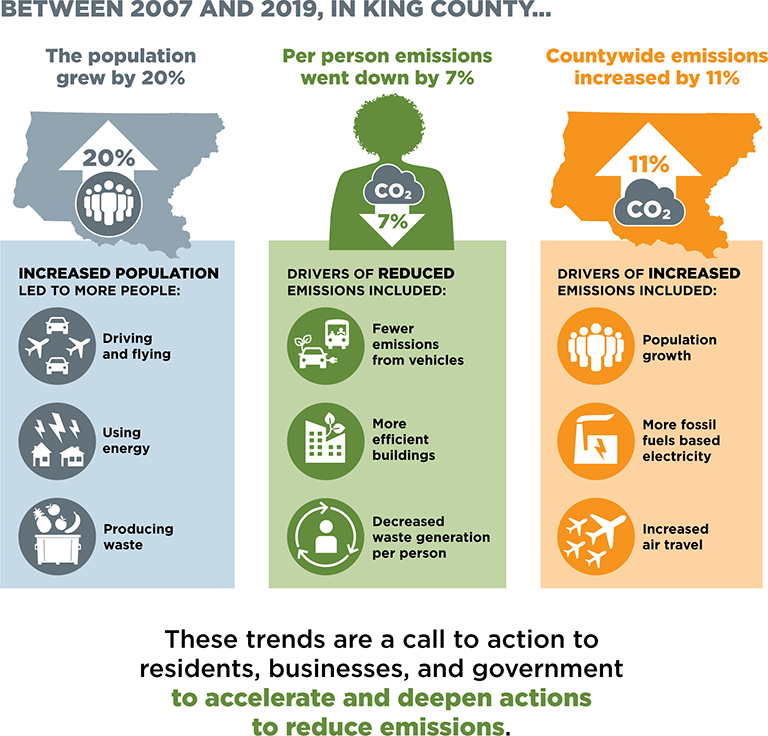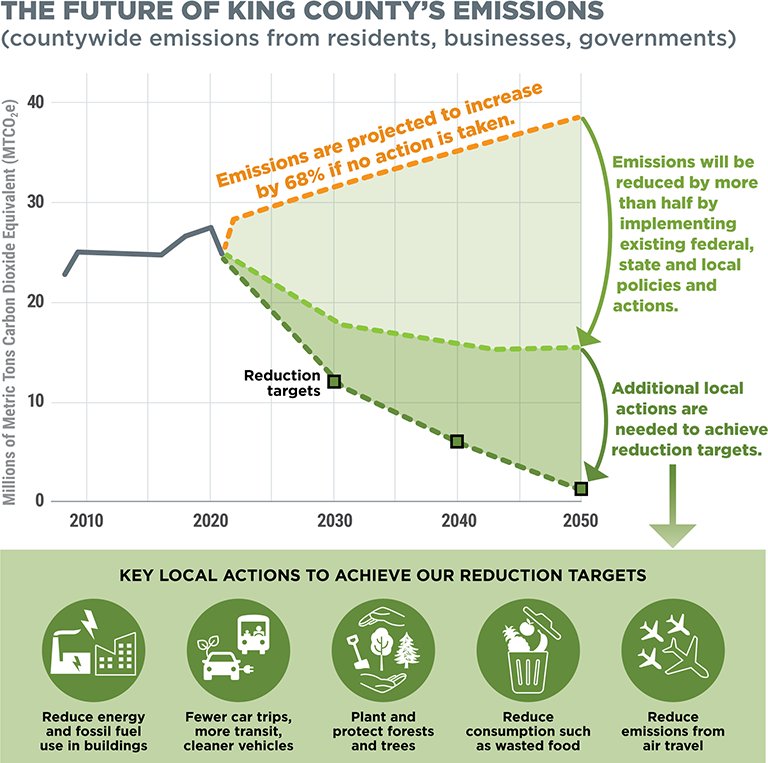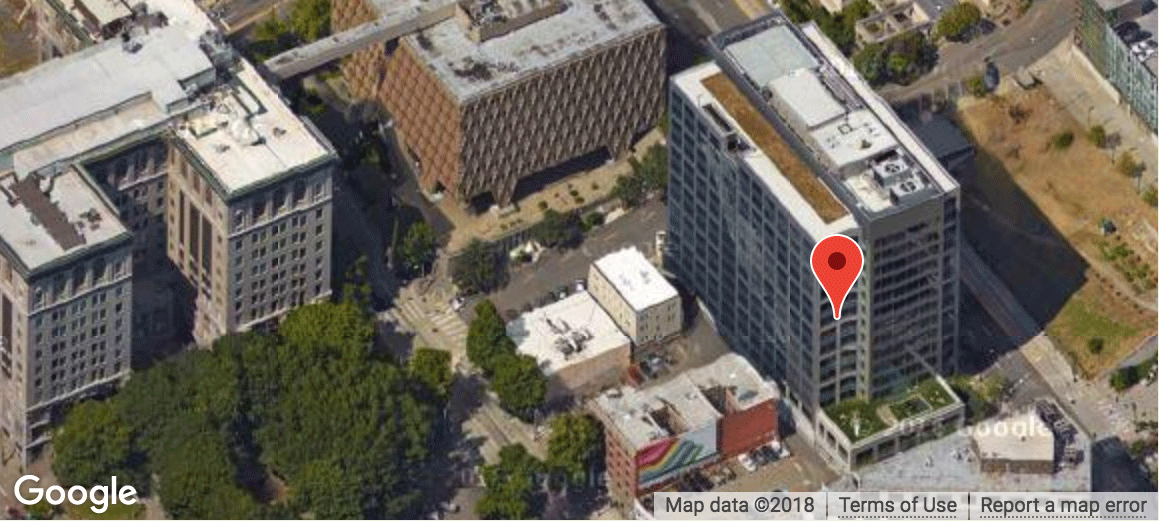‘The clearest call ever for immediate climate action’: Executive Constantine announces new actions to rapidly reduce countywide greenhouse gas emissions
Summary
Executive Constantine’s proposed budget includes actions to decrease countywide greenhouse gas emissions at a faster pace as an analysis of the Puget Sound region shows an urgent need for collective action to avoid the worst impacts of climate change.
Story
A first-of-its-kind analysis led by King County found that greenhouse gas emissions per person have decreased as the result of more energy efficient vehicles and buildings, but total emissions have increased as the population has grown. The study provides comprehensive greenhouse gas emissions data and innovative tools to advance local climate action for Puget Sound cities and counties.
The study determined that implementing new local, state, and federal energy policies will significantly reduce emissions over the next few years and that King County is well positioned for unprecedented investments from the recently signed Inflation Reduction Act. However, the analysis shows an urgent need for collective action by local governments, industries, businesses, and residents to cut emissions faster to avoid the worst impacts of climate change and transition to an equitable, sustainable economy.
King County Executive Dow Constantine included several new actions in the budget he presented to the County Council to decrease countywide greenhouse gas emissions at a faster pace.
“The latest study of countywide greenhouse gas emissions is the clearest call ever for immediate climate action,” said Executive Constantine. “Thanks to the solid foundation that we have built in our region and state, we are in a strong position to leverage unprecedented federal investments in solutions to the climate crisis and accelerate the transition to a clean energy future. It is our responsibility to the communities we serve, and particularly to the generations who will follow, to do everything we can as soon as we can.”
In the 2023-2024 budget he presented to the King County Council, Executive Constantine proposed:
- Creating a new program that will make it possible for more homeowners to get the low-interest loans they need to transition from fossil fuels to clean energy for heating, cooling, and cooking
- Investing $180 million to purchase battery-electric buses and $43 million in zero-emissions infrastructure to ensure that Metro’s 1,400-coach bus fleet is zero emissions by 2035
- Supporting community-led responses to climate change with $460,000 for the Climate Equity Task Force
- Establishing a new Climate Office to elevate the county’s commitment, coordination, and ability to deliver on climate actions internally and in partnership with cities and regional partners

The new study – called the Puget Sound Regional Emissions Analysis – found that greenhouse gas emissions per person decreased by 7% between 2007 and 2019 while total emissions increased by 11% over the same period. Total emissions significantly dropped in 2020, primarily as the result of the pandemic. While there are lessons to be learned from 2020, the project focused on comparisons between 2007 to 2019 before the pandemic started.
Several factors contributed to observed trends:
- King County’s population increased by 20%
- In 2019, 70% of the electricity generated by Puget Sound Energy – one of two utilities serving King County – came from fossil fuels, a higher percentage than recent years. Puget Sound Energy is committed to more clean energy sources and to be coal free by 2025 and, like all utilities in the state, must be 100% greenhouse gas neutral by 2030.
- Emissions from air travel increased by more than a third from 2008 to 2019, accounting for about 15% of total countywide emissions before the pandemic.
Analysts say the data does not reflect major climate actions that have occurred since 2019, noting that recent advancements – such as new state requirements for clean fuels and clean buildings along with upcoming federal investments in renewable energy and innovative technology – will produce historic dividends. The data indicates that these policy achievements, once fully implemented and supported by residents and businesses, will cut greenhouse gas emissions in half by the end of the decade.
In 2021, King County and all 39 cities in the county established shared emission reduction targets of 50% by 2030 and 95% by 2050. The study shows how those targets will be achieved through federal, state, and local policies and investments, in combination with business and individual actions.
The most impactful local solutions for the region, analysts found, are:
- More transit, walkable communities, fewer car trips, and greener vehicles
- More energy-efficient homes, workplaces, and other buildings free of fossil fuels
- Less waste generated by household consumption
One of the biggest keys to reducing the number of car trips is effective growth management by the county and cities, promoting walkable communities that offer convenient access to transit and trails.
The project was led by King County in partnership with the King County-Cities Climate Collaboration (K4C), Kitsap County, Pierce County, Puget Sound Clean Air Agency, Puget Sound Regional Council, City of Seattle, and Snohomish County.
For the first time, the project provides each of the 39 cities in King County comprehensive, city-specific greenhouse gas emissions data and new planning tools to accelerate and prioritize local climate action strategies.

The analysis found that implementing recent regional, state, and federal policies will get the region halfway to its goal of cutting greenhouse gas emissions countywide in half by the end of the decade.
- The Inflation Reduction Act recently signed by President Biden will bring unprecedented new investments for climate justice and clean energy solutions.
- State climate laws are now taking effect, including the Clean Energy Transformation Act which will replace fossil fuel-based electricity sources with clean, renewable ones, the Climate Commitment Act which puts a price on carbon pollution, and a statewide Clean Fuel Standard which will lower emissions of cars and trucks.
- King County is implementing its 2020 Strategic Climate Action Plan along with community partners, helping fill the gaps needed to achieve emission goals that state and federal actions alone will not achieve.
King County is leading regional actions to achieve 2030 and 2050 greenhouse gas targets with investments in zero-emission transportation, passage of strong energy codes for commercial buildings, extreme heat and wildfire mitigation strategies, and investments in community-led projects that reduce emissions and provide workforce pathways in the emerging green economy.
Building on momentum to reduce greenhouse gas emissions
Example actions that King County is taking with cities and other partners to cut greenhouse gas emissions, prioritize climate equity, and increase climate resilience include:
- Waste reduction and resource recovery: Reimagining waste management through Re+, a new initiative that centers on diverting the 70% of reusable materials that go to the landfill each day back into the economy. Re+ will keep an estimated 135,000 tons of food out of the garbage and reduce greenhouse gas emissions equivalent to 150,000 barrels of oil each year.
- Energy and buildings: Launching C-PACER, an innovative program that makes low-interest financing for energy and seismic upgrades available for more than 4,000 existing buildings and new construction, strengthening building and energy codes for unincorporated communities, installing solar arrays at 11 county facilities, most recently on Vashon Island.
- Climate equity and quality of life: Planting, protecting, and preparing a combined 3 million trees throughout King County, making access to green affordable homes connected to high-capacity transit more equitable, providing $20 million in climate equity funding for projects such as increasing access to solar arrays and making neighborhoods more walkable.
- Transportation and transit: Electrifying one of the nation’s largest bus fleets, rolling out the state’s first battery-powered heavy-duty truck manufactured in Renton, expanding regional trails that connect to high-capacity transit, and providing free transit to all youth until age 19.
Relevant links
- King County greenhouse gas emissions
- King County-Cities Climate Collaboration
- King County climate action
Quotes
The latest study of countywide greenhouse gas emissions is the clearest call ever for immediate climate action. Thanks to the solid foundation that we have built in our region and state, we are in a strong position to leverage unprecedented federal investments in solutions to the climate crisis and accelerate the transition to a clean energy future. It is our responsibility to the communities we serve, and particularly to the generations who will follow, to do everything we can as soon as we can.
It is only through regional cooperation that we will be able to address the twin challenges of adapting to climate change and reducing greenhouse gas emissions. Doing nothing is not an option, or our economy, environment, and quality of life will suffer. I want to thank King County for their partnership as we join with others across the region to speed reduction of emissions and improve our resilience. We will continue to prioritize those projects that will have the greatest impacts and prioritize our most vulnerable communities, including restoring habitat, achieving net zero emissions, and preparing for wildfires and other expected impacts of climate change.
This is the first thorough inventory and analysis of Green House Gas Emissions completed for Kitsap County. The planning tools produced through this project provides fundamental information needed to ensure our growing communities are resilient against the impacts of climate change. As we plan for growth in the Puget Sound area, we must work collectively to reduce Green House Gas Emissions. Kitsap County is grateful for the opportunity to work together with neighboring counties on this project as emissions know no boundaries and have a cumulative effect.
The City of Seattle supports King County’s leading work on climate and looks forward to our continued partnership on regional solutions to address this great challenge. Empowered by the information that is emerging from this study and further analysis being conducted by the City of Seattle, we are committed to addressing greenhouse gas emissions from our buildings and transportation sectors, as well as emissions associated with the production & consumption of goods and food. And we will do this while prioritizing economic opportunities and investments in communities historically most harmed by economic, racial, and environmental injustices.
We are grateful to partner with King County and others across the region to identify where we need to reduce greenhouse gas emissions and can gain the greatest benefit for our future—particularly in underserved and overburdened communities. We are ready to do our part, and more, to urgently address the climate crisis and expand our region’s zero-emission transportation options.
For more information, contact:
Chase Gallagher, Executive Office, 206-263-8537

 Translate
Translate

